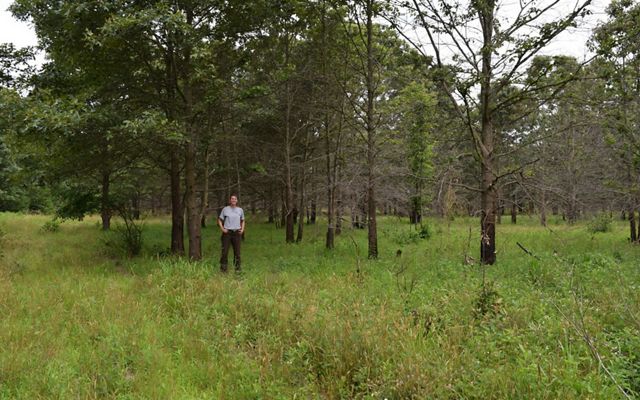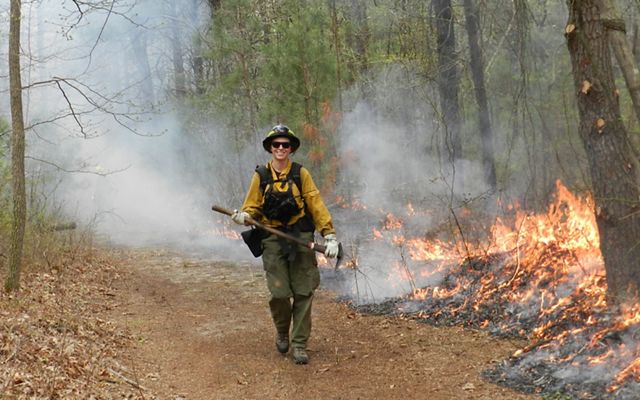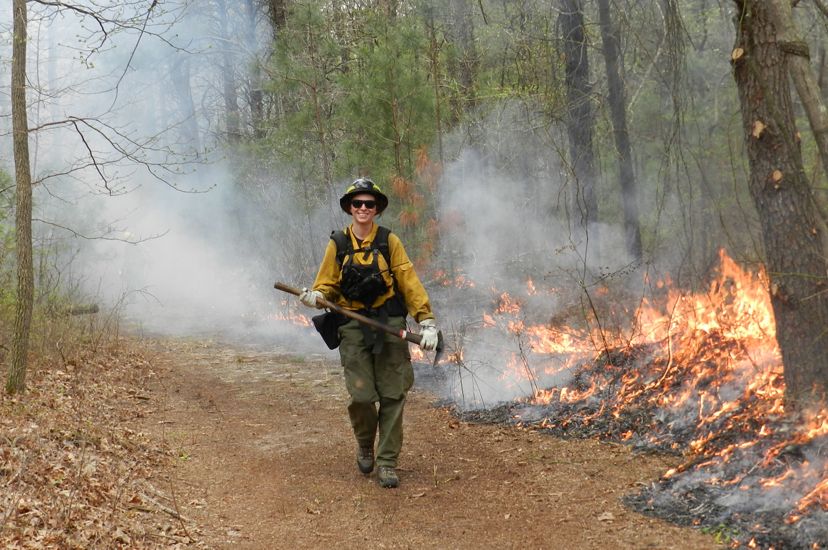
Women in Conservation Meet a few of the incredible women in Pennsylvania and Delaware who are working with TNC to create a better and more sustainable natural world for future generations. © Lynnya/Shutterstock
Representation matters for women, for conservation and for our future. From the coasts of Delaware to the mountains of Pennsylvania, women are working with The Nature Conservancy (TNC) to increase biodiversity, advocate for policy solutions, analyze datasets, leverage partnerships and much more. Meet a few of the incredible women in Pennsylvania and Delaware who are creating a better and more sustainable natural world for future generations and learn about their on-the-ground work.
Michelle Giles
Pennsylvania Federal Policy Manager
I find policy work can get overlooked in the conservation field, but as TNC’s CEO Jen Morris says, “Policy is our biggest pathway to transformational change.” Policy can help create funding opportunities, it can help protect nature and people, and it can give everyone a seat at the table.
I’ve been in the conservation field for about seven years, starting as a tech in a conservation genetics lab and eventually working my way into the policy sphere. My desire to become involved in this work started when I was a kid, visiting zoos with my dad any time we were in a new city. During one of our visits, I learned the term “endangered species” and was shocked that the animals I was excited to see weren’t necessarily going to be around for my entire lifetime. I felt compelled to do something, and I decided I wanted to make a change and leave a positive impact on the planet.
Quote: Michelle Giles

Many people of color, especially women of color, become involved in this field because it’s a necessity for them. I am so grateful to these people who continue to inspire me to fight the good fight within my role.
When thinking of a recent example of policy working in conjunction with conservation, I can’t help but recall the site visit I organized with Pennsylvania Senator Bob Casey to show the on-the-ground work of TNC’s Family Forest Carbon Program (FFCP). The program, which allows smaller landowners to participate in carbon markets, was something Senator Casey was interested in. After that site visit, Senator Casey introduced the Rural Forest Markets Act, a program similar to the FFCP but on a larger scale. I was thrilled to be able to help TNC push this message forward and gain the backing of a U.S. senator.
There are so many women who inspire me, but one who stands out is Hazel Johnson. Hazel was an environmental activist in the South Side of Chicago and is known as the mother of environmental justice. Her story is so moving to me because it’s the story of a woman standing up against a powerful entity and fighting against injustices her community was facing, which is an extremely difficult and brave thing for a black woman to do. Many people of color, especially women of color, become involved in this field because it’s a necessity for them. I am so grateful to these people who continue to inspire me to fight the good fight within my role.
Natasha Whetzel
Delaware Stewardship Program Manager
I grew up in the longleaf pine savannas of the southeast, one of the most diverse ecosystems across the globe. I spent a lot of my time immersed in nature. I saw Venus flytraps growing on the coastal plains, I frequently hiked and kayaked and I got to witness how the area evolved and adapted to fire over time. All my time outdoors led me to form a close relationship with nature and care deeply for plants and animals.
From increasing biodiversity to promoting healthy forests and grasslands, improving resilience and protecting rare and endangered species, my role touches down on so much conservation work. I currently oversee TNC’s preserves in Delaware, which involves the management, restoration and monitoring of those properties, as well as fire management.
My first role in conservation was as an intern with TNC in North Carolina. Over the years, there have been so many projects and programs I have worked on, but one that I am the proudest of is our Delaware fire management program. It’s grown from just myself when I came to Delaware in 2016, to now having a full-time seasonal fire crew who helps burn nearly 2,000 acres across DE, PA and MD annually. I am so thrilled by how the program has blossomed and continues to grow.
Rachel Carson has been someone I’ve admired for a long time. She spearheaded America’s environmental movement and helped protect bald eagles and pelicans, which have since made a stellar recovery since her advocacy. She even helped originally establish TNC as an organization. I am so grateful for the work she put into this field.
If you’re looking for a very rewarding career, I would recommend the conservation field. Now more than ever, the field needs people from all backgrounds, cultures, genders and all walks of life. In order to make concrete impacts in combating the climate crisis, all voices need to be heard.
Lori Brennan
Executive Director for TNC PA/DE
I’ve always had a passion for making a difference and a deep appreciation and love of the natural world. Locally, I enjoy hiking in the Pocono Mountains of Pennsylvania and exploring the waters from my kayak in southern Delaware. Wherever I go, I find new outdoor places to explore. Going into the field of conservation and saving these important places felt like a natural fit for me.
As the executive director for TNC PA/DE, I lead a 50+ person team of talented scientists and professionals in conservation, fundraising, marketing, finance and operations. Together, we address the most critical organizational projects and threats and develop conservation strategies that deliver bold impacts locally while also contributing to TNC’s ambitious 2030 goals.
As someone who has worked in this field for seven years, I am amazed every day by just how smart, dedicated and passionate my colleagues are. No matter their function or team, they all play a critical role in advancing our important mission. There is room for all in this field, and I encourage everyone to try new things until they find what speaks to them. The climate crisis does not have time to wait, and we can all make a difference.
My mother, Patti, is one of the most influential women in my life and helped inspire me to pursue a career in conservation. Growing up, she encouraged recycling and waste reduction in our home, making me a better steward of the Earth and igniting my desire to do more for our planet. She demonstrates strength, courage and authenticity and has taught me never to be afraid to try things or to speak my mind. She showed me the power of my individual voice and the importance of giving back.
Tamara Gagnolet
Conservation Science & GIS Manager
I started in conservation 25 years ago studying squirrel monkey behavior in the Peruvian Amazon. From there, I took on more ecological field assignments but ultimately realized studying animal behavior was not necessarily going to help save these species and their habitats. I decided to pursue my graduate education in natural resource management and forestry, and there I discovered my passion for applying Geographic Information Systems (GIS) to conservation. GIS involves collecting, managing, analyzing and displaying spatial data that represent elements of the real world, such as land use, parcels and habitat types, and that can identify trends and patterns through space and time.

More About GIS
Watch this webinar recording with Tamara and colleagues to learn more about how TNC leverages geospatial technology to help conserve and manage ecosystems in Pennsylvania, Delaware and around the world.

What I love most about my work is that I support all areas of conservation. GIS supports TNC’s land protection and management, freshwater, coastal and cities programs by managing and analyzing spatial datasets and creating maps. These datasets help us identify conservation priorities, assess protection and restoration needs, manage habitat and trails on TNC preserves, monitor our conservation easements, model climate change impacts and more.
I also manage TNC’s Global Geospatial Leadership Council, where I collaborate with 30 council representatives from around the world to produce centralized resources that help support our greater geospatial community of ~1,700 users at TNC.
As a global leader in conservation and animal welfare, Jane Goodall has always been an inspiration to me. I admire how she has used her status for so much good in the world, helping to open people’s eyes to chimpanzees’ intelligence and complex social relationships and advocating for community-centered conservation programs.
Nicole Wooten
Appalachians Land Protection Manager
I believe nature and people are inseparable. Keri Inouye, a friend at Eagle Valley Land Trust, recently taught me about mālama ʻāina, a Hawaiian phrase and way of living that means to care for, respect and protect the land. It recognizes that people and land are a part of each other, and their well-being is linked.
I wanted to work in the conservation field because it’s one way to create positive change for the areas and communities I care about. Conserving the right land in the right way with the right relationships is one of many tools we need for issues like equity, climate resilience and wildlife connectivity.
Quote: Nicole Wooten

Everyone is part of nature by breathing air, drinking water and living...It’s all connected.
In my current role, I protect the Appalachian landscape by helping TNC acquire lands and waters in the region. If there’s a forest for sale that’s part of a resilient climate corridor and important for wildlife—like the Kittatinny Ridge and Allegheny Front—I work alongside landowners, nonprofits and agency partners to buy and protect it. This land can be anything from 5 acres connecting parks near a city to a 1,000-acre forest core in a remote mountain town.
I am immensely grateful to all the amazing women mentors I’ve had throughout my 18 years in this field. Especially my mother who inspires me every day. She utilizes well-organized love and logic to help her community and the world around her. I also must credit women sci-fi writers like Octavia Butler and N.K. Jemisin who help me see the world in a new way. As adrienne maree brown said, “Science fiction is simply a way to practice the future together.” I find it inspiring to read visions of what the world can one day be.
Everyone is part of nature by breathing air, drinking water and living. I encourage folks to lean into that. Making balanced thriving communities is also conservation work. It’s all connected.
Diana Oviedo Vargas
Assistant Research Scientist at Stroud Water Research Center & TNC PA/DE Board Member
I was always drawn to nature, specifically water. My favorite natural resources are waterfalls. When I travel, I always prioritize visiting falls when I can. It felt only natural to study environmental science and eventually go on to become a water research scientist.
As a research scientist at Stroud, I focus on water resources and research that helps quantify the value of conserving water resources and analyzing their benefits. Recently, I have been working on a project in partnership with the National Park Service where I am helping analyze a data set of water quality from parks in the region.
This work has helped us understand the value of the parks’ conserved lands in terms of the protection of water resources. Next, we will share our findings with the park managers to help them gain insights into the impact they are making with their conserved lands and understand best practices that have been working well for them.
I always admired TNC’s science-driven work, ever since I first heard of the organization when I came to the U.S. for graduate school. Now, as a board member for the PA/DE chapter, I’ve had the privilege to witness the work TNC is doing on the ground and how they are utilizing science to prioritize, ensure and sustain conservation. I feel honored that I can bring my background and perspectives to the chapter to help guide the critical work being done.
I feel grateful to work in a field I am so passionate about and am extremely thankful to my grandmothers. They were both strong women who worked to break the many barriers women were facing in 20th-century Latin America. They worked hard to ensure the next generation of women in our family were able to have the freedom and ease to follow their dreams. I wouldn’t be where I am without them.
Elizabeth Hanson
Land Steward & Fire Technician
As a land steward, I am a part of a network of caretakers working to help maintain and manage protected lands. I maintain hiking trails, assist with prescribed fires to increase biodiversity and connect people to nature at our Pennsylvania preserves.
I’ve spent a lot of the last few years at our Hamer Woodlands at Cove Mountain Preserve near Harrisburg working with our amazing volunteers to manage invasive species. We spent 207.5 hours cutting and spraying invasives, and I feel we are in a great place with this project. It’s so thrilling to be able to see the fruits of our labor when looking at the vegetation at the preserve.
I never thought I would stay in the same job for more than a few years, but I have been performing this work for ~15 years, which speaks to the awesomeness of being a land steward. There are different seasons of work that we get to do, so my job duties are always unique and changing.
I did not initially anticipate going into the conservation field. I aspired to be a vet, but once I assisted with some fieldwork studying jackrabbits at school, I switched gears and wanted to take a path where I could work outside and ultimately still help wildlife and animals. I feel extremely fulfilled and grateful I get to do just that as a land steward. My goal is to be a land steward and spend time outdoors protecting habitats and connecting people to nature for as long as I can.
I must give credit to Sami Gray, a fire management officer, who was a pioneer for women working in fire at a time when the field was predominately run by men. I was lucky enough to overlap with Sami at the Mississippi Sandhill Crane National Wildlife Refuge, where I witnessed her leading a crew of men with a natural power and mutual respect. She was an incredible leader. It was the coolest thing for me to be able to see, and it inspired me to train to go into prescribed fire and stewardship. Years later, while in my role at TNC, I had the opportunity to partner with Sami on a prescribed burn. It was the perfect full-circle moment.
The Hamer Woodlands at Cove Mountain
Dive deeper and learn more about how our work at Cove Mountain creates a more connected, healthy and climate-resilient Appalachians for the future.

Deborah Dalley Phillips
TNC PA/DE Volunteer
Ever since I was a young child, I found myself immersed in nature. My father would often take me into the forest and teach me about nature’s abundance, the gifts it provides us and how to respect the natural world. This time spent in nature with my father ignited a deep-rooted passion for the environment, one that I wanted to share with others.
I’ve spent the last 20 years volunteering for various environmental organizations like Clark Country Wetlands and The Nature Conservancy. Upon realizing that many folks are not aware of the local outdoor recreational trails near them, I even volunteered to start my own outdoor “club,” Walk and Wine Friends, where I lead hikes and encourage people to explore the natural world, right in their backyards. No, we don’t have wine after every hike…
Through all my years volunteering, what I have appreciated the most about TNC is how far-reaching the organization is. As someone who has lived in the desert, the mountains and now the coast, TNC has always been around and acted as an excellent educational tool for me, providing me with resources and opportunities for volunteering.
My favorite part of volunteering for TNC is being able to share my love and knowledge of nature with others. I especially enjoy helping people discover their own love for nature, plants and animals and, of course, encouraging them to get outside whenever possible. If I am outside, I am in my happy place.
Stay in Touch
Sign up to receive monthly e-mail conservation news & updates from your state.
























